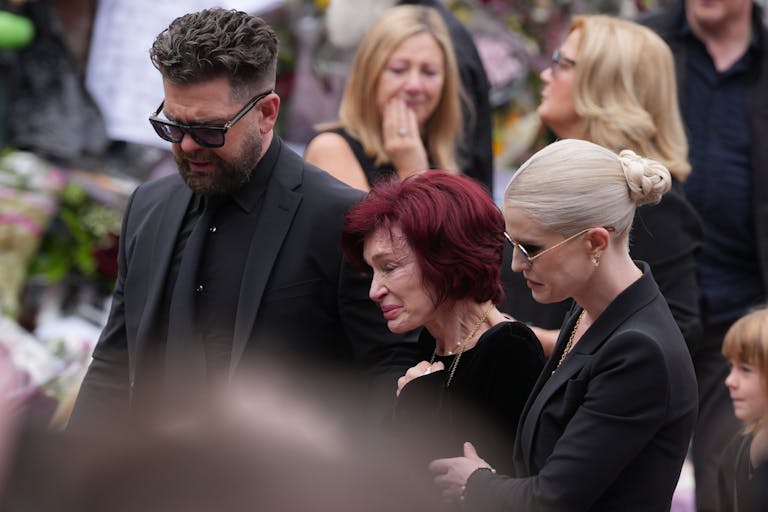
Sharon Osbourne says her kids and grandkids are 'the reason' she's still alive
Cassy Cooke
·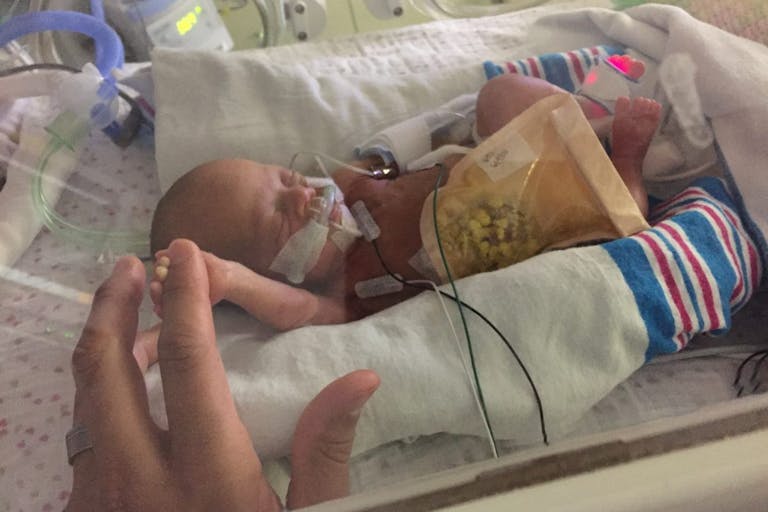
Human Interest·By Nancy Flanders
Born premature at 24 weeks, baby Marlo is a ‘miracle’
Carla Ricciardone and her husband, John Doherty, were happily awaiting the arrival of their first child, a baby girl named Marlo. The pregnancy was progressing normally and everything on the ultrasounds looked great. But then at 23 weeks, Ricciardone woke at 3 o’clock in the morning in labor. Marlo was arriving way ahead of schedule.
The doctors did what they could to stop the labor, but it didn’t matter. Five days later, at 24 weeks, with Marlo in the breech position and labor rapidly progressing, the doctors took Ricciardone in for an emergency C-section. That’s when they learned the cause of the preterm labor: placenta abruption. Marlo was born weighing just one pound, five ounces.
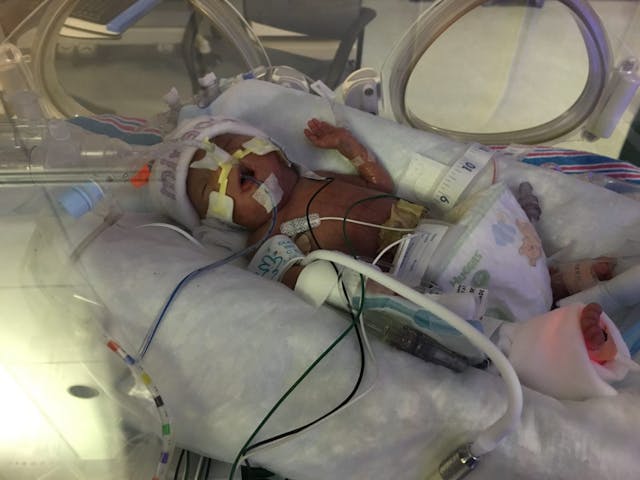
“She was scooped up by the doctors. They immediately did all of their wonderful things,” said Ricciardone. “They intubated her and wrapped her in Saran wrap. She didn’t have skin and if we didn’t wrap her she would evaporate. She was a fighter from day one. Constantly moving with one eye open. She was a miracle from day one.”
But at three weeks old, Marlo became very sick. She got a gram-negative infection and was placed on antibiotics. However, she struggled to get better and had to be taken to a different hospital to see a pediatric surgeon.
“She kept swelling,” said Ricciardone, “and they suspected a level three brain bleed, but that ended up to be a misreading of the ultrasound.”
At about one month, in front of the surgeon, Marlo’s intestines ruptured and she was rushed to the emergency room. Doctors discovered that she had necrotizing enterocolitis (NEC), a serious intestinal disease common in preemies, as well as a perforation in her bowel.
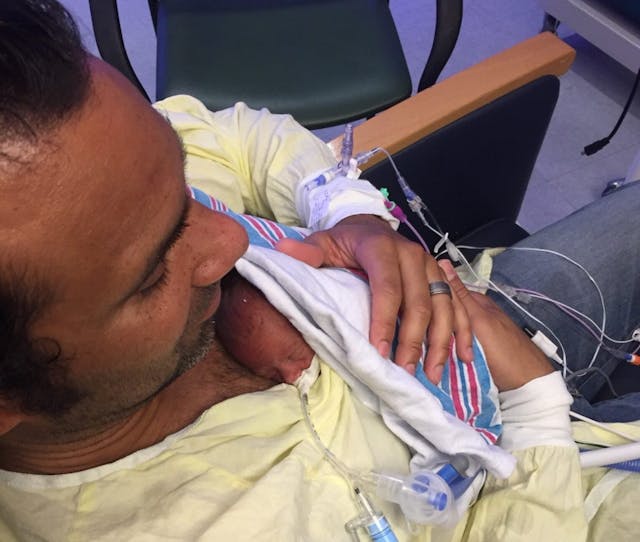
“She lost a centimeter and a half of her intestine,” said Ricciardone. “But the intestine had a chrysalis around the infected area so when it ruptured, it didn’t spill out into her abdomen. It saved her life.”
Marlo was given an ileostomy bag so the doctors could keep a closer eye and make sure the NEC didn’t get worse without having to open her up. Marlo recovered from the surgery and has been doing well ever since.
“She came off the ventilator early. Hit her milestones well. They attribute all of that to breast milk,” said Ricciardone. But there was a problem.
After Marlo was born, Ricciardone was overproducing breast milk, but with all of Marlo’s complications, that soon changed.
“I was making a crazy amount,” she explained. “When she started to nurse, she’s so tiny that what she demanded became my supply. Because her demands seemed small, my body adjusted to that and I lost my output.”
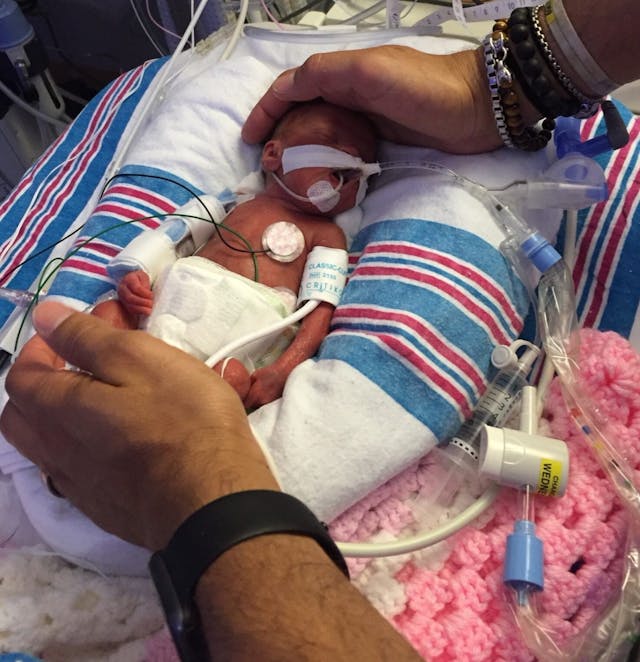
Doctors had encouraged Ricciardone to breastfeed from day one. All babies benefit from breast milk, but especially preemies. Chances of survival increase if they are given breast milk rather than formula, and countless studies have shown extensive benefits. Pre-term infants who were given breast milk had better cognitive and psychological development. Breast milk also helped reduce feeding-related deaths in pre-term infants from conditions such as necrotizing enterocolitis, osteopenia, vitamin and mineral deficiencies, and nosocomial infections. Plus, formula can cause a lot of problems for preemies.
While in the hospital, the doctors added a fortifier to Marlo’s breast milk, and she ended up with a fever and reflux. Her stools were abnormal. Once she was taken off of the fortifier, all of those issues cleared up.
Article continues below
Dear Reader,
In 2026, Live Action is heading straight where the battle is fiercest: college campuses.
We have a bold initiative to establish 100 Live Action campus chapters within the next year, and your partnership will make it a success!
Your support today will help train and equip young leaders, bring Live Action’s educational content into academic environments, host on-campus events and debates, and empower students to challenge the pro-abortion status quo with truth and compassion.
Invest in pro-life grassroots outreach and cultural formation with your DOUBLED year-end gift!
“They told me she has to have breast milk, absolutely. Especially because they are going to reverse the surgery in November,” said Ricciardone.
But with Ricciardone no longer producing enough milk to keep her daughter growing, she’s had to look for help and alternatives. She has worked with a lactation consultant and done everything she can, but nothing has worked. That’s when she turned to a milk bank. The problem? It costs $30 a bottle – adding up to $300 to $500 a day for the next 11 months. Marlo must drink double what she needs because she is unable to absorb it all, since it doesn’t go through her large intestine. Insurance covers formula, but not breast milk.
“We’d have to mortgage our house to pay that,” said Ricciardone.
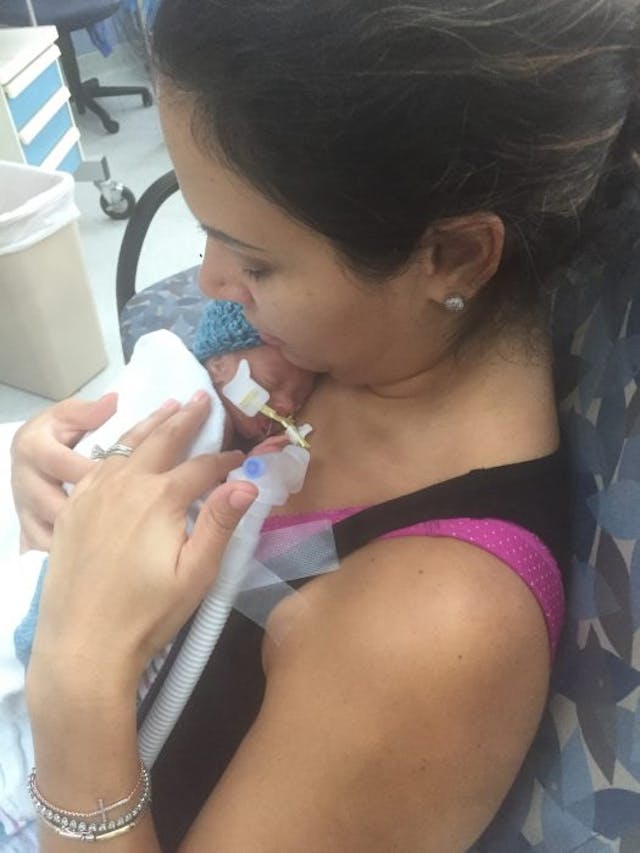
Outraged that she wasn’t able to get her daughter the breast milk she desperately needs, Ricciardone reached out to friends on Facebook and the local media. Donations began pouring in.
“I had people driving breast milk up my driveway. I know most of the women. They are nursing their own children, and we pasteurize it at home, just in case, for bacteria that could have been transferred in the plastic that it was put it,” explained Ricciardone.
Because of her own vigilance when Marlo was first born, and the generosity of others, Ricciardone has enough breast milk stored up and donated to last a bit longer for Marlo. After that, she isn’t sure what will happen.
“There is a bill on the Governor’s [Cuomo] desk awaiting signature that covers prescription breast milk for Marlo and other pre-term babies through Medicare for the first year of their life, for when it’s medically necessary,” she said.
She is urging New York residents to send a letter to Governor Cuomo asking him to sign the bill. However, she isn’t sure the law will be passed in time to help Marlo get the breast milk she will need when their supply runs out. Regardless, Ricciardone says her efforts to get this law passed is about more than Marlo.

“If I can’t do something to help her right now, I need to make people aware that this is happening. Even if I just get 100 people to send this letter, maybe it would reinvigorate the fires around the people who have been fighting for this for so long,” she explained.
“These babies are suffering and they’re already fighting so much. From a mother’s perspective, it’s hard enough guilt-wise to give birth to a pre-term baby. I felt I failed as a mother. I couldn’t even keep her in long enough to keep her healthy. Then you realize you can’t feed your baby – not being able to do what’s best for your baby is like being kicked when you’re down. There are many women who can’t produce at all.”
Ricciardone says she is “beyond grateful” for the nearly 30 women who have reached out to her to provide Marlo with breast milk. They are women who are currently breastfeeding, women who were weaning their child but decided to start pumping just to help Marlo, and even women who have lost their baby and felt a sense of purpose for their child’s life in being able to help another baby thrive. But along with that gratitude, Ricciardone is also shocked and outraged that babies who have a medical need for breast milk aren’t able to get it.
If you’d like to learn more about the bill, visit Mother’s Milk Bank Northeast’s website.
Live Action News is pro-life news and commentary from a pro-life perspective.
Contact editor@liveaction.org for questions, corrections, or if you are seeking permission to reprint any Live Action News content.
Guest Articles: To submit a guest article to Live Action News, email editor@liveaction.org with an attached Word document of 800-1000 words. Please also attach any photos relevant to your submission if applicable. If your submission is accepted for publication, you will be notified within three weeks. Guest articles are not compensated (see our Open License Agreement). Thank you for your interest in Live Action News!

Cassy Cooke
·
Human Interest
Nancy Flanders
·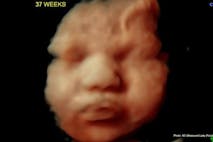
Politics
Nancy Flanders
·
Human Interest
Angeline Tan
·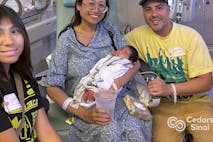
Human Interest
Bridget Sielicki
·
Human Interest
Nancy Flanders
·
Human Interest
Nancy Flanders
·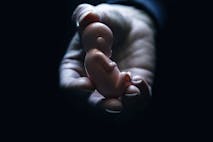
Analysis
Nancy Flanders
·
Politics
Nancy Flanders
·
Activism
Nancy Flanders
·
Issues
Nancy Flanders
·